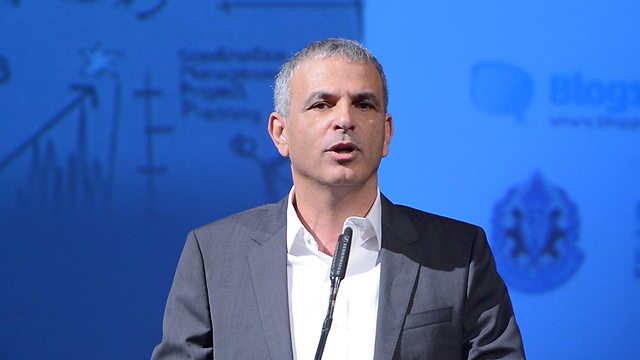
Moshe Kahlon at the Ynet studio
Kahlon: Economic reforms will leave people with more money
Kulanu leader talks about his proposal to separate credit card companies from banks in order to create more competition that would benefit consumers.
A day after revealing his economic plan, which is centered on a proposal to limit banks' activities, Kulanu chairman Moshe Kahlon came to the Ynet studio on Wednesday morning to explain his proposal to separate credit card companies from banks.
"I think that generally, a leadership needs to be compassionate. A leadership without compassion cannot lead," Kahlon said. However, "I don't see compassion in Israel's economic leadership. It's true that it's easier to occupy ourselves with Iran and other security issues - that's okay, I don't consider that lightly - but two feet need to be stable on the ground - an economic foot and a diplomatic foot. There's no social foot in the Israeli government today."
Kahlon's proposal calls to separate credit card companies from the banks that control them and turn them into independent companies. Meaning, Isracard will be separated from Bank Hapoalim, Leumi Card from Bank Leumi and CAL from Discount Bank. The objective of the proposal (that has been raised before) is to put an end to the conflict of interests that currently exists.
"People will gain by having competition - today they have three large banks, and now they'll have six," Kahlon said.
"There used to be three cellphone companies, today you have five. When there was no competition, the customer was a captive (of the telecommunications companies) and had to pay more.
"As soon as people pay less, they'll have more money for other things. It'll be a success and make money. The banks own the credit card companies and we are coming to them and saying 'take the three credit card companies and turn them into banks.'"
Kahlon said the competition "will lower commissions, lower the interest rate and (improve) bank services. Citizens will enjoy thousands of shekels a year from this competition."
"The cellphone reform brings in NIS 5 billion a year. Those who paid NIS 600 a month before and now pay just 60, use the remaining 540 to buy shoes. This money goes back to the economy. These platforms make the economy and the market more efficient."
Kahlon believes economic issue can be at the center of the elections campaign. "There's no doubt that both the prime minister and the head of the opposition have an interest to avoid these topics. One is dealing with bottles, the other with the corks. We can defeat the cost of living crisis, that's what Kulanu believes. We can defeat the housing crisis, we can defeat this situation in which kids here can't buy an apartment. Others won't touch it, and they know why."
Kahlon said he refrains from dealing with personal issues. "I'm more concerned with the fact people's salary runs out after two weeks. I'm concerned that we're paying a lot of money for taxes, food and housing. It's more concerning to me than personal or moral issues."
To those torn between Likud and Kulanu, Kahlon said: "I joined Likud because of social issues and I left Likud over social issues. Bibi and I are from two completely different worlds. My socio-economic policy is different to his, because otherwise I'd still be (with Likud).
"Those who care about society, who care about narrowing social gaps, people who can't make ends meet - then we're going to win. The money for this will come from reforms. We need to start out somewhere, even if it takes two-three-four years, but if we don't start, it'll never happen."
Kahlon's party Kulanu is currently far behind its competitors with less than 10 mandates in polls, but Kahlon is not worried. "I think we'll get a lot more mandates. People out on the field, on the street, are saying different things. With a lot of mandates we'll be able to get the Finance Ministry and deal with not only housing, but also the cost of living and narrowing social gaps."











